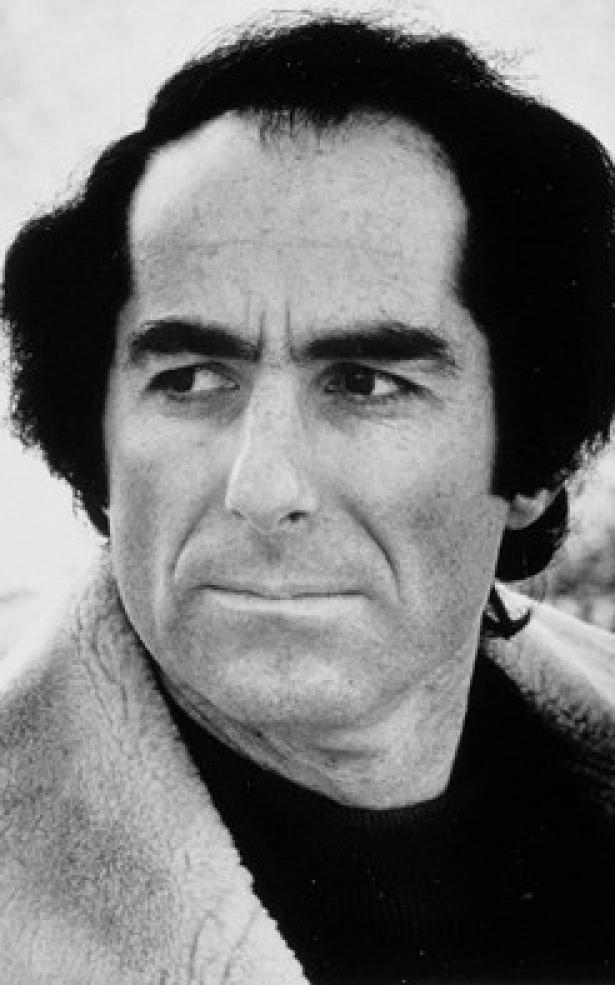I never had the “talk” with my parents. I had only the “book”: Portnoy’s Complaint, which one evening my mother, in a rare embarrassed flush, tossed in my direction before escaping to her bedroom, trailed by a rushed “You might get a kick out of that.” It was the old mass-market paperback—not the famous yellow-and-red jacket that blared like a siren, but the edition with maroon block text stamped over a brownish background, giving the impression that the novel had been discreetly wrapped in a brown paper bag, or perhaps brown butcher paper, like the kind that enclosed the “maddened piece of liver” Alexander Portnoy violated behind a billboard on the way to Hebrew school.
I had just been kicked out of Hebrew school, a year ahead of my bar mitzvah, and I felt an immediate intimacy with the novel’s author, Philip Roth. Though two generations separated us, I felt that he spoke directly to me or, in some mystical, incoherent sense, spoke from somewhere inside my brain. I had read novels that frightened and delighted me, made me laugh, made me question—Roth’s writing did all that, but it also elicited a spookier response. I had never before read a writer who knew me. It was a shock to discover that others felt the same way—including many who were not Jewish teenage boys.
Roth called this the “ruthless intimacy” of fiction. In a speech given at a celebration of his eightieth birthday, he argued that such intimacy can only derive from “a scrupulous fidelity to the blizzard of specific data that is a personal life.” In many of the appreciations published since his death on May 22 there has persisted the misunderstanding that the main appeal of Roth’s fiction lies in his characters’ biographical circumstances: predominantly Jewish, middle-class, sex-obsessed, self-tormented. The posthumous criticisms commit the same error—Roth’s work is “narrow” and “tiresome” for the repetitiveness of his subject matter. (The same might be said of Jane Austen, Marcel Proust, Fyodor Dostoevsky, and one of Roth’s literary idols, Saul Bellow.) There’s something to this—what Hebrew school dropout doesn’t cherish the moment in “The Conversion of the Jews” when Ozzie Freedman orders his mother and his rabbi to acknowledge that “God can make a child without intercourse”? But Roth’s genius has nothing to do with biographical coincidence.
It is found, as he put it himself, in his work’s “concreteness, its unabashed focus on all the particulars, a fervor for the singular and a profound aversion to generalities.” He saw more precisely, and therefore more honestly, than anyone else. One doesn’t have to be Jewish, male, sexually ravenous, or consumed by rage and love for one’s mother to empathize with Alexander Portnoy, Nathan Zuckerman, David Kepesh—or, for that matter, a breast.
He had an especially sharp eye for the physical detail that reveals the character of a person, a place, a time, a relationship. In Patrimony, his memoir about his father’s death, the act of holding in his hand his father’s saliva-damp dentures erases “the divide of physical estrangement that…had opened up between us once I’d stopped being a boy.” In Sabbath’s Theater, as Mickey mounts Drenka, Roth gives us the apparition of Mickey’s mother “hovering just above his shoulder, over him like the home plate umpire peering in from behind the catcher’s back”; there’s Mickey for you. In American Pastoral, Roth pauses on “a blurry line of footprints worn into the wood floor where the men stood all day at the cutting tables” of the Newark tannery where Swede Levov enjoys the daily glory of hard work done well, and where he is visited by his missing daughter’s avenger. When, at night, Swede finds himself alone in the factory, he likes “to go and stand with his shoes where the floor was worn away.” All the tragedy of American Pastoral exhales through that line.
Roth’s professional life ended in 2012, when he announced his retirement. We now enter the awkward period of reassessment, contrarian posturing, and personal revelation—with Blake Bailey’s authorized, in-progress biography looming. Roth was so anxious to protect the details of his private life from public scrutiny that he tried to deny its very existence: “writing in a room by myself is practically my whole life,” he often insisted, convincing nobody. But the whole life will soon emerge in great detail, not all of it flattering. Some time after that, the life will again recede in significance, and the work/life balance will settle in its proper proportion, which is approximately 100/0. It’s foolhardy to predict literary fate; all one can do is take a snapshot of the moment. But this fool predicts that several generations from now Roth will be considered the central American novelist of the second half of the twentieth century.
In his 1984 Paris Review interview, Roth spoke of the struggle of American writers to make sense of a culture in which “everything goes and nothing matters,” a phrase that today shrieks in neon. He defended the ambition “to write a serious book that doesn’t signal its seriousness with the rhetorical cues or thematic gravity that’s traditionally associated with seriousness.” The Plot Against America, a book that in the last year has become a modern-day counterpart to Sinclair Lewis’s It Can’t Happen Here, is a serious book in the conventional sense, announcing its seriousness in the premise; When She Was Good and The Counterlife fall in the same category. These are outliers, however. Most of his novels lacked the rhetorical cues and themes of conventional American drama, but were no less serious for it. That was the trick of his art: to be at the same time the most serious writer of his generation and the funniest.


Spread the word